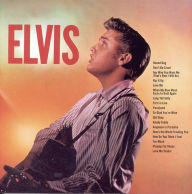
Monumental and essential, Elvis Presley’s second chart-topping 1956 long-player is so exciting in its original form that the six powerful bonus tracks tacked onto this 70th birthday reissue (including the epochal “Don’t Be Cruel” and “Hound Dog”) smack of piling on. Leaving his competitors in the dust, a commanding Elvis is singing and swinging in a free-and-easy style that also packs scintillating authority and deep conviction. His phrasing and intonation are often as casual and sly as a bluesman’s, but at other junctures they’re as precise and tenderly rendered as those of a great pop/R&B stylist such as Billy Eckstine. And look what the King, then exploding like a supernova on the cultural scene, brought to his audience: a couple of Little Richard barn burners (“Rip It Up,” “Ready Teddy”); a Leiber-Stoller castaway called “Love Me” that is transformed into a pleading, breathtaking tour de force of heartsick love balladry; a bopping Otis Blackwell–penned celebration of new love, “Paralyzed”; Red Foley’s mawkish folk song about a boy and his dog, “Old Shep” (with which a 10-year-old Elvis took second prize at the Mississippi-Alabama Fair in Tupelo); a rhythmically charged country ditty, “When My Blue Moon Turns to Gold Again”; and a winsome ballad, “First in Line,” featuring an ethereal, slightly echoed vocal that’s intelligently pitched as an expression of woozy, lovestruck sentiment. The indomitable band — guitarist Scotty Moore, bassist Bill Black, and drummer D. J. Fontana — is supplemented, for the first time on an Elvis session, by the great gospel quartet the Jordanaires, whose Gordon Stoker also shares piano duties with Elvis. And in a time of gee-whiz liner notes, Chick Crumpacker’s uncredited observations about the King (he links him to a great tradition of folk singers beginning with Jimmie Rodgers) stand out for their perceptive musical analysis of the legend a-borning.

Click Here to Get Elvis!